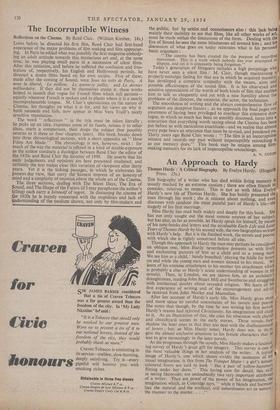- This aspect is treated of -with sensitive understanding ;
it has involved much studious working over the letters, re-dating some of them in such a way as to confirm new findings by Professor Hyder Rollins ; episodes have h6en collated', Woodhouse's -transcripts studied ; much has been cleared up as regards Keats's life ; we know him better, and our respect is increased. But if this were all, Mr. Gittings's book would be merely another piece of biography, useful, but not very exciting. To all this, however, is added a careful documentation of Keats's reading during the period, an account of the things he saw ; and what we are told amounts to a revelation about how Keats the poet worked ; how his sensibility and his imaginative reason at once took in, absorbed, and made creative use of his sensations, and through this we understand the poetry more fully. We see how his reading of Burton's Anatomy of Melancholy, of Troilus and Cressida, of Dryden's translations entered into the very warp and woof of his work ; we learn how what he saw of old ' buildings at Chichester, at Stansted Chapel, entered immediately into his imagery ; how the frontispiece of Robertson's History of America provided certain lines in'' Lamia." We get an extraordinary sense of the living being of Keats the poet, whose furious spirit- consuming work of that year must have been conducive to the fatal haemorrhage which silenced him for ever. Not that Mr. Gittings makes extravagant claims to ' understanding ' the poetic process : he knows, indeed he asserts, that it cannot be wholly explained ' —after all, he is himself a poet : but he allows us to glimpse, without , any highfalutin tarradiddle, the sort of tendril which the poet sends out into the inapprehensible. And he shows us the whole Keats—the man who could write parodies, who could like and be bored by Haydon, who could dream and awake. His is an admirable book, unobtrusively but vividly and cleanly written, with an admirable apparatus of references : it is to be put on the shelf beside Mr. H. W. Garrod's edition, the Letters, and the studies by Miss Dorothy Hewlett and Mr. Middleton Murry.
BONAMY DOBRLE
(which examined a child's mind with some skill) should sink to this level of Brahms-and-Simon A Bullett in the Bard twaddle is not alto- gether surprising, Shakespeare (even if you spell him Shaxper, as Mr. Bullett does) or Keats or Burns—to think of a couple of recent books—it doesn't much matter who it is : if they're that big, leave 'em alone. If Mr. Bullett would only write about William Smith instead of this other fellow, Shaxper, he wouldn't get miminy-piminy whippersnappers writing irritable reviews ; they'd leave him in peace for the mellower, historically-minded chaps who would admire—as I ought to—the careful research which has gone into the book. As it is, I resent being made bored because Shakespeare has become Bob Cherry, and bang goes my sense of balance.
Mr. Feuchtwanger's 'Tis Folly to be Wise is a much more ambitious book than The Alderingn's Son. Loaded with historical detail, packed with irrelevant characters, it is highly professional, very long and quite dead. It mackme anyway take down the Confessions to see if Rousseau really was the odd literary gent that Mr. Feuchtwanger makes him out to be. He wasn't. So I left 'Tis Folly to be Wise somewhere around page 320 and went on with M. Rousseau.


















































 Previous page
Previous page